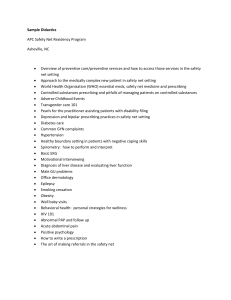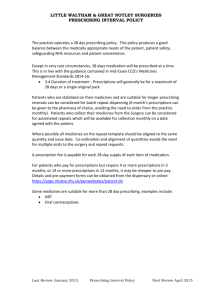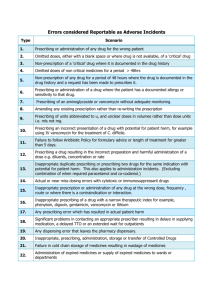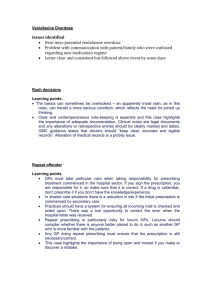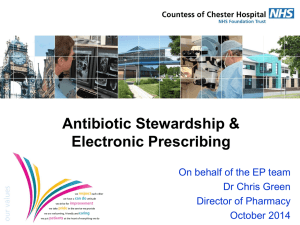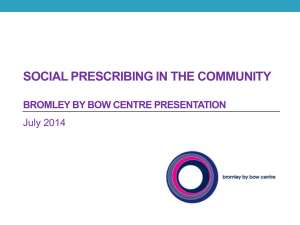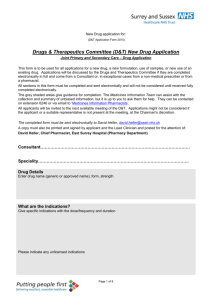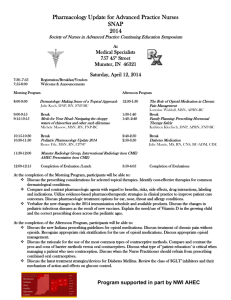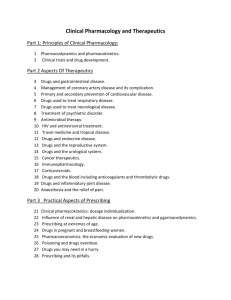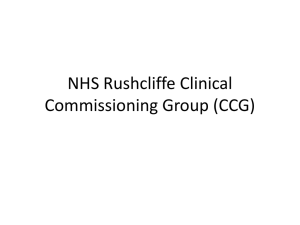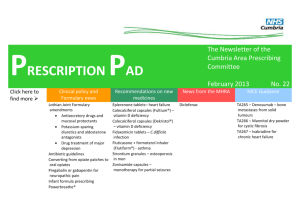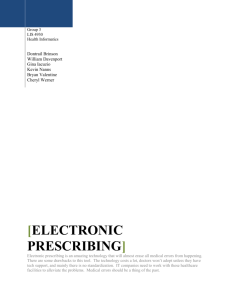New Drugs Update from APC
advertisement
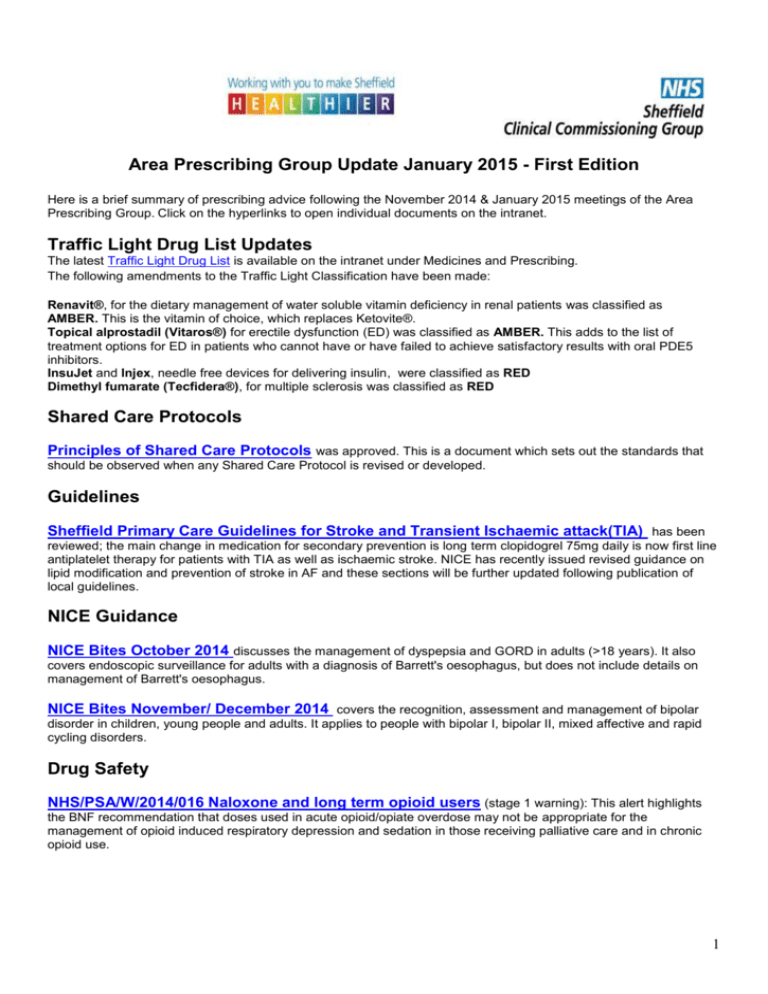
Area Prescribing Group Update January 2015 - First Edition Here is a brief summary of prescribing advice following the November 2014 & January 2015 meetings of the Area Prescribing Group. Click on the hyperlinks to open individual documents on the intranet. Traffic Light Drug List Updates The latest Traffic Light Drug List is available on the intranet under Medicines and Prescribing. The following amendments to the Traffic Light Classification have been made: Renavit®, for the dietary management of water soluble vitamin deficiency in renal patients was classified as AMBER. This is the vitamin of choice, which replaces Ketovite®. Topical alprostadil (Vitaros®) for erectile dysfunction (ED) was classified as AMBER. This adds to the list of treatment options for ED in patients who cannot have or have failed to achieve satisfactory results with oral PDE5 inhibitors. InsuJet and Injex, needle free devices for delivering insulin, were classified as RED Dimethyl fumarate (Tecfidera®), for multiple sclerosis was classified as RED Shared Care Protocols Principles of Shared Care Protocols was approved. This is a document which sets out the standards that should be observed when any Shared Care Protocol is revised or developed. Guidelines Sheffield Primary Care Guidelines for Stroke and Transient Ischaemic attack(TIA) has been reviewed; the main change in medication for secondary prevention is long term clopidogrel 75mg daily is now first line antiplatelet therapy for patients with TIA as well as ischaemic stroke. NICE has recently issued revised guidance on lipid modification and prevention of stroke in AF and these sections will be further updated following publication of local guidelines. NICE Guidance NICE Bites October 2014 discusses the management of dyspepsia and GORD in adults (>18 years). It also covers endoscopic surveillance for adults with a diagnosis of Barrett's oesophagus, but does not include details on management of Barrett's oesophagus. NICE Bites November/ December 2014 covers the recognition, assessment and management of bipolar disorder in children, young people and adults. It applies to people with bipolar I, bipolar II, mixed affective and rapid cycling disorders. Drug Safety NHS/PSA/W/2014/016 Naloxone and long term opioid users (stage 1 warning): This alert highlights the BNF recommendation that doses used in acute opioid/opiate overdose may not be appropriate for the management of opioid induced respiratory depression and sedation in those receiving palliative care and in chronic opioid use. 1 Drug Safety Updates October 2014 - Interferon beta-1a and interferon beta-1b are immunomodulatory drugs indicated for the treatment of remitting relapsing multiple sclerosis. A European review has suggested that there may be an association between interferon beta treatment and thrombotic microangiopathy and between interferon beta treatment and nephrotic syndrome. Although interferon-beta is red on the Sheffield TLD, primary care clinicians will need to be vigilant for signs and symptoms of thrombotic microangiopathy and nephrotic syndrome in patients prescribed these products (e.g Rebif®, Betaferon®). December 2014 - Ivabradine in treatment of chronic angina: advises on actions to minimise the risks of cardiac side-effects. Ivabradine is amber in the traffic light drug list for both angina and heart failure indications. Patients should be monitored for bradycardia and atrial fibrillation and ivabradine should not be prescribed with other medicines that cause bradycardia. Isotretinoin: reminder of possible risks of psychiatric disorders. No new data but a reminder to monitor patients receiving isotretinoin for signs of depression, anxiety and suicidal ideation. This is a red traffic light drug but GPs need to be aware of risk of psychiatric disorders. GP practices are reminded to add isotretinoin as a HOD so that drug interactions and potential side effects can be picked up. Update information on non-vitamin K oral anticoagulants (NOACs) Recent incidents have highlighted safety issues with prescribing NOACs and so the above advice may be useful. Safer Prescribing of oral Amiodarone advises of actions to be taken in primary and secondary care to ensure the safer prescribing of amiodarone. Furthermore the attached medicines management team member will be auditing compliance with the amiodarone shared care protocol and ensuring that the transfer of care (TOC) forms are being used, over the coming months. Other Fosfomycin and Pivmecillinam The existing primary care guideline on the use of fosfomycin for the treatment of multiple resistant UTIs has been updated and can be found here. Please note that the current fosfomycin sachet presentation supplied in Sheffield remains an unlicensed product and should only be prescribed following advice from the STH microbiology department. As part of the commissioned extended hours pharmacy service, Wicker Pharmacy stocks fosfomycin so that there is on-demand availability in the event of urgent clinical need. All pharmacies are able to procure this product so patients may be signposted to the pharmacy of their choice. In addition, the STH microbiology department will now be recommending the use of the mecillinam antibiotic pivmecillinam as an option for the treatment of resistant UTIs on selected sensitivity reports. Pivmecillinam is an oral antibiotic licensed for acute uncomplicated cystitis as a three day course. For more prescribing details, see the Summary of Product Characteristics sheet here. Abbreviated Antibiotic Guideline Offers a summary of the full guideline and highlights the recommended treatment for the most common infections seen in primary care i.e. respiratory, skin and urinary tract infections. Medical Information queries, for assistance see this guidance. Palliative Care: Guidance for Medicines Management of Community Patients in Last Days of Life has been revised and key changes are as follows: The Palliative algorithms for pre-emptive prescribing for pain, respiratory tract secretions, breathlessness, agitation and nausea/vomiting have been updated and the doses reviewed There are new algorithms for prescribing in patients with a creatinine clearance < 30ml/min The document is intended to be printed in booklet format For further information on the above, or if you have issues that may need to be addressed by the APG, please contact Sharron Kebell or Gary Barnfield on 0114 3051331. Visit the APG section on the intranet for full details of our prescribing advice and guidelines. 2
